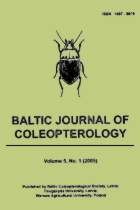Structure of ground beetle (Col., Carabidae) communities in a montane forest on Mt Sw. Krzyz (Swietokrzyskie Mts) and in Szymbark (Carpathians, Poland)
Main Article Content
Abstrakt
Carabid beetles were collected from May to September into glycol-filled pitfall traps in a montane forest habitat. The study period was divided into 5 monthly trapping cycles. A total of 288 individuals representing 18 species were captured on Mt Sw. Krzyz and 358 individuals representing 11 species were captured at Szymbark. The two communities were markedly different, as indicated by low qualitative (45%) and quantitative (27%) similarity as well as a small degree of overlap between the respective dominance structures (22.2%). On the other hand, there was considerable similarity in terms of ecological categories studied, with the same ecological elements predominating in both. The Sw. Krzyz community was also compared with communities studied at the same sites in 1992 and 1993. Here, too, there were considerable qualitative and quantitative differences and differences in dominance structures combined with marked ecological similarity (the same elements predominated in the specific categories studied). On the whole, there was immense qualitative and quantitative variation in space and time and considerable ecological stability. These findings indicate that quantitative and qualitative changes are not always accompanied by significant alterations in the ecological structure of communities. It is suggested that this broadens the scope for interpreting the relationships between patterns of change in Carabidae communities and environmental factors.
Article Details
Statystyki
Downloads
Download data is not yet available.
Rekomendowane teksty
